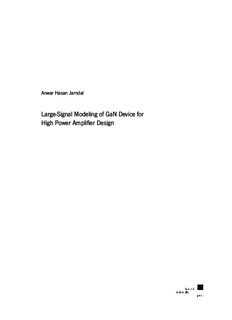Table Of ContentAnwar Hasan Jarndal
Large-Signal Modeling of GaN Device for
High Power Amplifier Design
This work has been accepted by the faculty of electrical engineering / computer science of the University of
Kassel as a thesis for acquiring the academic degree of Doktor der Ingenieurwissenschaften (Dr.-Ing.).
Supervisor: Prof. Dr.-Ing G. Kompa
Co-Supervisor: Prof. rer. rat. H. Hillmer
Commission members:
Prof. Dr.-Ing. J. Börcsök
Prof. Dr. sc. techn. D. Dahlhaus
Defense day: 10th November 2006
The publication was funded by Deutscher Akademischer Auslandsdienst
Gedruckt mit Unterstützung des Deutschen Akademischen Auslandsdienstes
Bibliographic information published by Deutsche Nationalbibliothek
Die Deutsche Nationalbibliothek lists this publication in the Deutsche Nationalbibliografie;
detailed bibliographic data is available in the Internet at http://dnb.ddb.de
Zugl.: Kassel, Univ., Diss. 2006
ISBN: 978-3-89958-258-1
URN: urn:nbn:de:0002-2097
© 2007, kassel university press GmbH, Kassel
www.upress.uni-kassel.de
Printed by: Unidruckerei, University of Kassel
Printed in Germany
To my father’s soul, my mother, my wife, and my family
Acknowledgements
Praise to Allah who gave me the ability to finish this research work. I would
like to thank the University of Hodeidah, Yemen, and Deutscher
Akademischer Austausch Dienst (DAAD), Germany, for their financial
support that allowed me to pursue this research. I would also like to thank
my supervisor and mentor Prof. Dr.-Ing. G. Kompa for the guidance and the
encouragement he offered me throughout my research in the Department of
High Frequency Engineering, University of Kassel. I would also like to
thank my second examiner Prof. Dr. H. Hillmer for accepting this task,
Prof. Dr. J. Börcsök and Prof. Dr. D. Dahlhaus for their acceptance to be
members of the examination committee. I would also like to thank my
colleagues in the Department of High Frequency Engineering for their
friendship and all of their help over the past years. I would like to offer my
gratitude to my mother, my wife, my sisters and my brothers for their love
and encouragement, which has enabled me to finish this dissertation.
Anwar Hasan Jarndal
Contents
Chapter 1: Introduction 1
References. ………………………………………………. 6
Chapter 2: AlGaN/GaN HEMT Device 10
2.1 Basic HEMT Operation……………………………. 10
2.2 AlGaN/GaN HEMT Material……………………… 12
2.3 AlGaN/GaN Structure……………………………… 14
2.3.1 Polarization Effect in AlGaN/GaN HEMT….. 14
2.3.2 Surface States (Traps)……………………….. 16
2.4 AlGaN/GaN HEMT Technology…………………... 17
2.4.1 Device Fabrication…………………………... 17
2.4.2 Fabrication Related Problems……………….. 19
2.4.2.1 Buffer Traps…………………… 19
2.5 AlGaN/GaN Performance…………………………. 21
2.5.1 IV Characteristics…………………………… 21
2.5.2 RF Characteristics…………………………... 24
References…………………………………………. 26
Chapter 3: Fundamentals of Active Device Modeling 29
3.1 Device Modeling Approaches……………………… 29
3.1.1 Physical Modeling…………………………… 29
3.1.2 Empirical Modeling………………………….. 30
3.2 Bottom-Up Modeling Technique…………………… 32
3.2.1 Quasi-Static FET Large-Signal Modeling……. 32
V
3.2.2 Non-Quasi-Static FET Large-Signal Modeling….. 34
3.2.2.1 Traps Induced Dispersion Modeling... 37
3.2.2.2 Self-Heating Induced Dispersion
Modeling………………………. 39
3.3 Device Characterization…………………………… 41
3.3.1 IV Measurements…………………………… 42
3.3.1.1 DC IV Measurements………….. 42
3.3.1.2 Pulsed IV Measurements………. 42
3.3.2 S-Parameter Measurements…………………. 43
3.3.3 Low Frequency Dispersion Measurements…. 44
3.3.4 Large-Signal Measurements. ………………. 44
3.3.4.1 Load-Pull Measurements……… 44
References…………………………………………. 45
Chapter 4: AlGaN/GaN HEMT Small-Signal Modeling 52
4.1 Distributed Small-Signal Equivalent Circuit Model… 52
4.2 Extrinsic Parameter Extraction………………………. 53
4.2.1 Generation of Starting Value of Small-Signal
Model Parameters……………………………. 55
4.2.2 Model Parameter Optimization………………. 64
4.3 Intrinsic Parameter Extraction………………………. 67
4.4 Small-Signal Model Verification…………………… 73
4.4.1 S-Parameter Simulation……………………… 73
4.4.2 Physical Validation…………………………... 75
4.5 Small-Signal Model Scaling………………………... 77
References…………………………………………... 82
Chapter 5: AlGaN/GaN HEMT Large-Signal Modeling 84
5.1 Large-Signal Model Equivalent Circuit…………….. 84
V I
5.2 Gate Charge Modeling………………………………. 86
5.3 Gate Current Modeling………………………………. 88
5.4 Drain Current Modeling……………………………… 89
5.4.1 Dispersive Table-Based Drain Current Model… 89
5.4.2 Trapping and Self-Heating Effects…………….. 90
5.4.3 Drain Current Model Fitting Parameter
Extraction……………………………………… 92
5.5 Large-Signal Model Implementation…………………. 93
5.6 Simulation and Measurement Results………………… 95
5.6.1 S-Parameter…………………………………….. 95
5.6.2 IV Characteristics………………………………. 97
5.6.3 Signal Waveforms……………………………… 98
5.6.4 Single Tone Input Power Sweep……………….. 98
5.6.5 Two-Tone Input Power Sweep……………….. 99
References……………………………………………. 102
Chapter 6: Conclusion and Future Work 104
VI I
List of Figures
2.1 (a) Simplified AlGaAs/GaAs HEMT structure, (b) corresponding band
diagram………………………………………………..……………. 10
2.2 (a) Simplified AlGaN/GaN HEMT structure, (b) corresponding band
diagram……………………………………………………………… 11
2.3 Electronic properties of AlGaN/GaN HEMT structure……………... 13
2.4 Electric field and sheet charges present (a) due to only spontaneous
polarization in GaN and AlGaN crystals; and (b) due to only
piezoelectric polarization in a AlGaN layer……………...………….. 14
2.5 Combined piezoelectric and spontaneous polarization field in
AlGaN/GaN structure……………………………………………….. 15
2.6 AlGaN/GaN HEMT structure showing polarization induced, surface
states, and 2DEG charges…………………………………………… 16
2.7 Epitaxial layer structure of the AlGaN/GaN HEMT [13]…………… 18
2.8 (a) Bad pinch-off DC characteristics, measured in house, of a 8x125 µm
gate width AlGaN/GaN HEMT (wafer no. 713-2) related to the buffer
leakage current, (b) kink effect in DC characteristics, measured in FBH,
of a 8x125 µm gate width AlGaN/GaN HEMT (wafer no. 713-2) related
to the buffer traps……………………………………………………. 20
VI II
Description:3.2.2 Non-Quasi-Static FET Large-Signal Modeling….. 34. 3.2.2.1. Traps Induced Chapter 5: AlGaN/GaN HEMT Large-Signal Modeling. 84.

